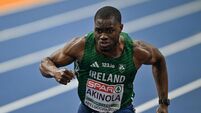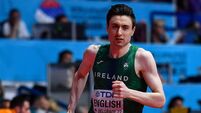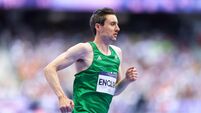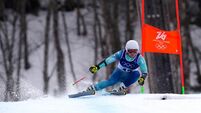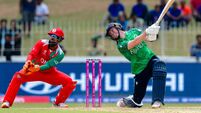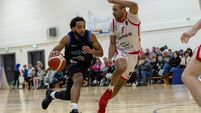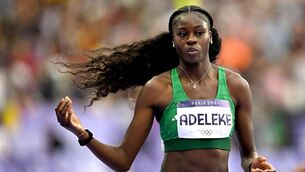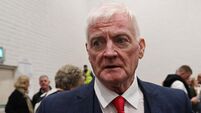'It’s a seismic change' - Paul McNamara reflects on the rise of Irish athletics
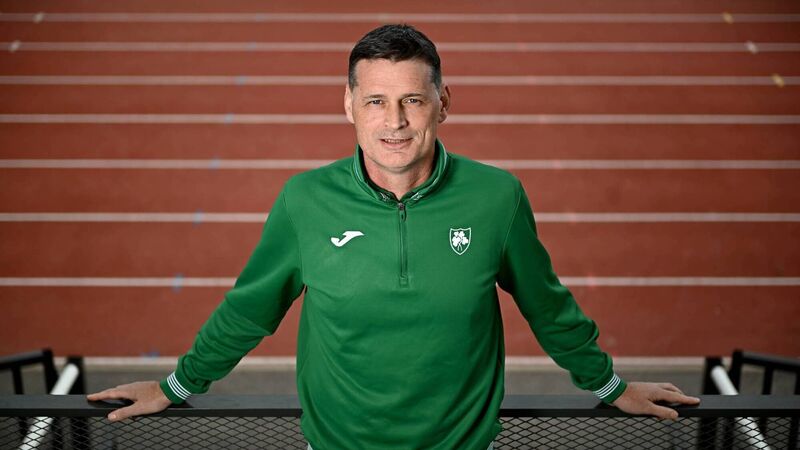
ON THE RISE: Athletics Ireland director of high performance Paul McNamara. Pic: Harry Murphy/Sportsfile
Things are different now. In so many ways.
When Paul McNamara reflects on the surging standards in Irish athletics across his eight years as Athletics Ireland’s High Performance Director, he knows there’s no single area that explains it.
“There are lots of things, and ultimately the system or the federation can only claim so much success,” he says.
“There is a lot of stuff happening behind the scenes. The fact we’ve built out the [high-performance] team, we’ve a head of sprints, head of endurance, head of field events – that’s instrumental.
“Added investment in pathways is huge. The philosophy of not pulling the ladder up on the sport is massive. Our access point for U-23s, seniors, relative to other nations, is quite low. Athletes are coming through again and again and again.”
Ireland sent a team of 28 athletes to Tokyo, with a support staff of 20 – mostly made up of their personal coaches.
“In Doha 2019, we’d eight athletes, four staff in total and we were at capacity,” he says. “It’s a seismic change, a systemic change.”
McNamara points to improved connectivity between athlete-coach pairings, high-performance staff and support services.
Increased investment has been key, the majority of Athletics Ireland’s revenue still coming from Sport Ireland but a levy on competitors in road races and fresh sponsorship from adidas have also boosted finances.
“The grassroots membership is contributing to the performances that happened in the stadium,” says McNamara. “Sport Ireland have played a big part. Go back to 2016; we’d about 10 athletes on Sport Ireland carding. It’s something like 28 now.”
McNamara notes there was “almost a 100 per cent overlap” between those who were funded this year and those who made it to Tokyo, with just a couple of exceptions in Israel Olatunde and Nick Griggs, who both had strong finishes to their seasons but it proved too late to make the World Championships.
“Investment in coaching has been huge,” adds McNamara. “Sport Ireland have been fantastic in that regard.”
He notes that it required “huge money” to ensure most of the Irish athletes had their coaches in Tokyo and he cites Cian McPhillips having both Joe Ryan and his strength and conditioning coach, Martina McCarthy, present during those crucial final weeks while Kate O’Connor had her three coaches and physio.
“With the best will in the world, we couldn’t have done that 10 years ago. That’s finance and it’s the intelligence to appreciate that lots of things happen outside of where we are that make performance happen. Our role is to facilitate that and without resources, we can’t.”
Tokyo proved a landmark event. McNamara crunched the numbers before it and figured that the Irish were looking at nine performances in the top-24. They got 15, with seven of those inside the top-12. That’s a vast improvement from McNamara’s first World Championships in this role in 2017, when just one Irish athlete – Rob Heffernan – cracked the top-12.
Results at individual championships can be subject to huge variance and so a more reliable metric is likely the average number of top-24 results across a four-year Olympic cycle. Ahead of Rio 2016 and Tokyo 2020, Ireland averaged four to five top-24s at global championships, while during the Paris cycle that rose to 10.
That this Los Angeles cycle has kicked off with 15 is significant, and McNamara believes Ireland currently has six or seven potential medal opportunities in athletics.
Not all of those will materialise, of course, but McNamara says they’ve “never even fantasised” about this position. The key now is to keep the momentum going.
“Our stated goal is to win an Olympic medal in the current cycle. We came close in the Paris cycle but the harsh truth is we didn’t deliver a medal. We’ve delivered two global medals since [via Kate O’Connor] and we have other athletes capable of delivering the same.”
The rising tide goes beyond results. “It’s also the mindset,” he says. “Athletes are seeing other athletes succeed. They come with an expectation to compete. There is a culture within the team environment. There’s an expectation that anybody getting on a plane to a global champs is looking to progress through the rounds.”
He credits the impact of support staff too. “The staff are here to serve, not for a holiday. I always look for people who are low-profile, hard workers. It’s not about you; it’s about everybody else. I do think that mindset has permeated throughout the entire system.”
There remains poor investment in coaching relative to other European nations, the majority of Ireland’s top coaches still doing it around their full-time jobs, but McNamara is hopeful that will change.
“We are going to invest more in terms of coaches working within the federation directly as opposed to [being] supported outside the federation to deliver and create a programme that emerging athletes coming out of school or university go, ‘That’s the option for me, the environment I want to be in, led by full-time professional coaches,’ rather than having to seek out a relationship and then [having] us fund that relationship.
“Simultaneously, we do want to support coaches that add value and create an environment that athletes migrate to, or in the case of [Kate O’Connor’s coach] Michael or [Nicola Tuthill’s coach] Killian Barry, for example, that provide niche expertise.”
McNamara credits O’Connor and her team for a “really well-executed plan” that saw the Dundalk athlete win four medals this year. “What she’s done is just seismic, and there’s more [to come] in the shot put and the long jump.”
He said Cian McPhillips’ breakthrough is “hard to get your head around” but notes that he’s a “supreme talent” with a “superb coaching team” behind him. “Hard work, common sense and logic – that’s what high performance is,” says McNamara.
“It’s been commented before that a lot of our athletes had to go away to compete at the top end. Look who our top performers are here, and how many of them are coached domestically. It’s a big, big difference.”



